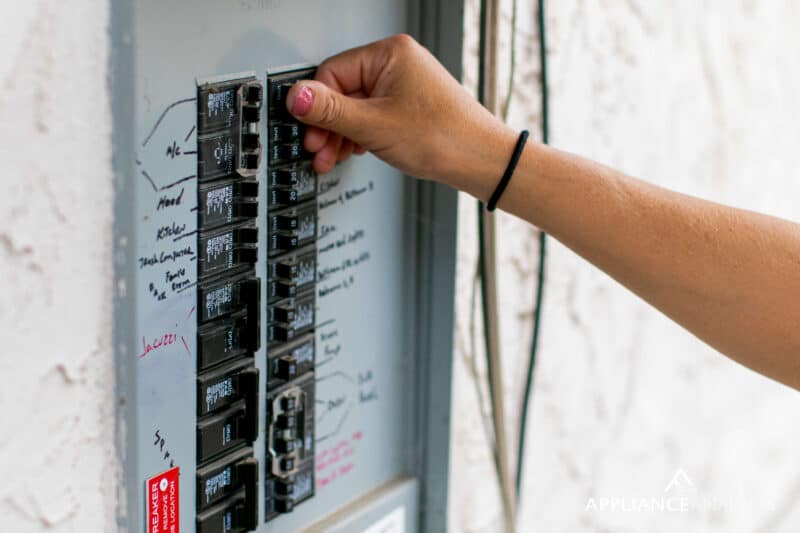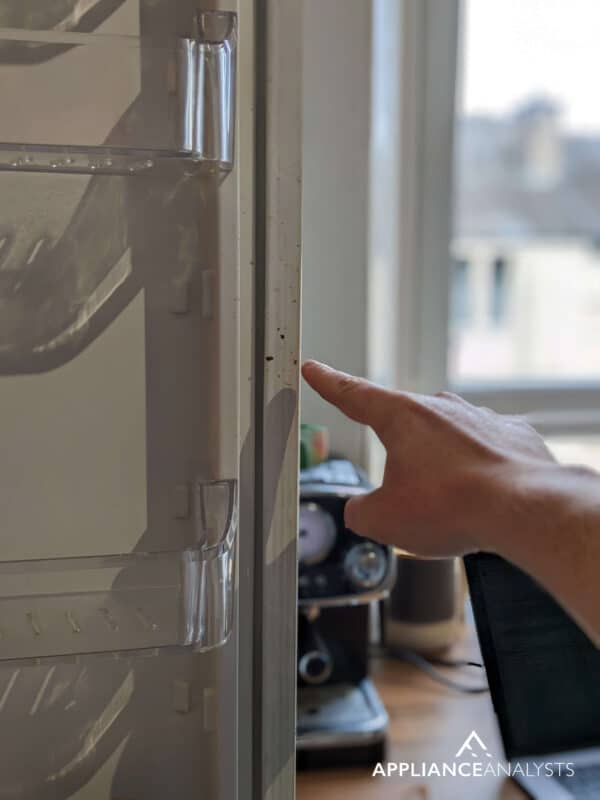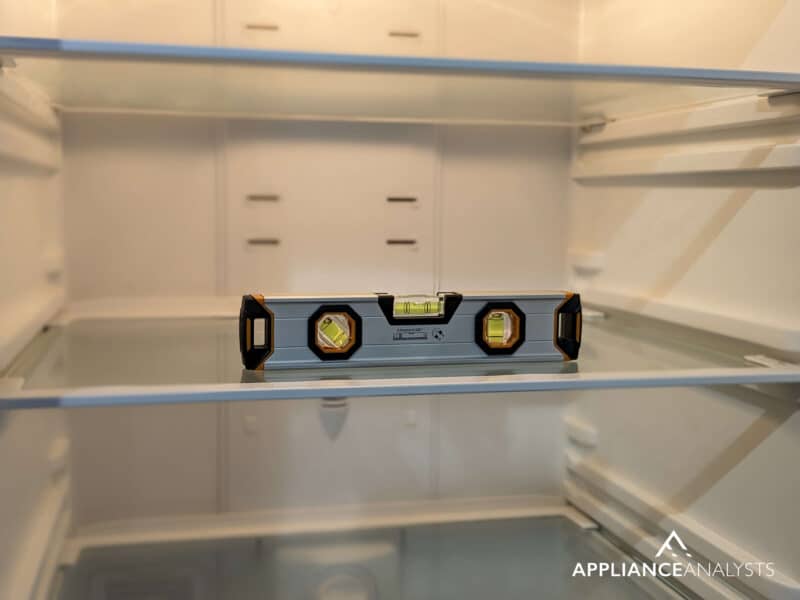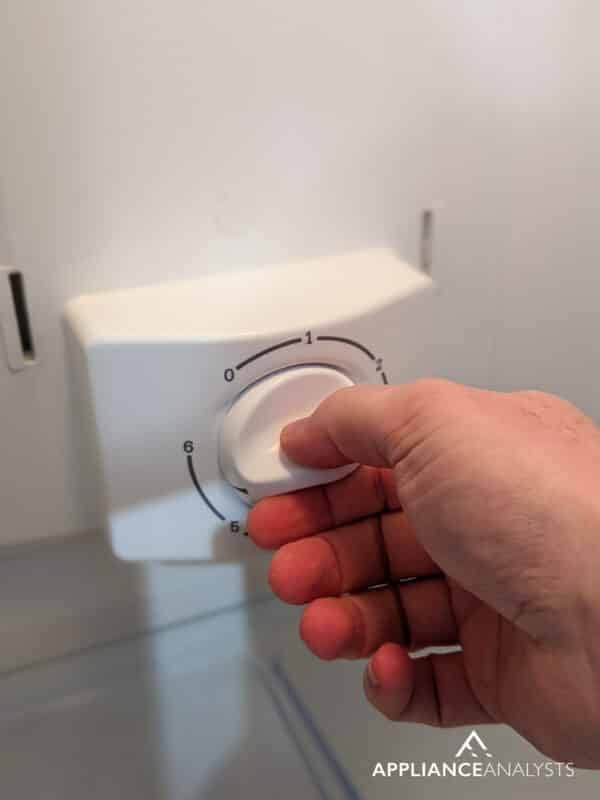We've independently reviewed this article to make sure it's as accurate as we can make it.
To find out more about our article creation and review process, check out our editorial guidelines.
Is your fridge alarm going off?
You’re not alone! A beeping sound can be concerning, especially when you don’t know what it’s indicating.
Luckily, you’ve come to the right place for answers.
If your fridge alarm keeps beeping, there’s probably a power issue, the door is not fully closed, or the temperature is too high. A faulty door alarm or circuit board can also explain the problem.
Read on to keep your fridge from beeping!
Why trust us? This article was written by Craig Anderson and Andy Fulenchek.
Craig has helped thousands of other homeowners repair their appliances since 2016.
Andy is one of our resident appliance repair experts with over a decade of experience. He currently runs his appliance repair company with a team of trusted technicians.
Why Is Your Fridge Beeping? 6 Simple Explanations
In this section, I’ll guide you through the different reasons that can explain why your fridge alarm keeps beeping and provide various solutions.
Are you ready? Let’s dive in!
#1 It’s a Power Issue
From what I’ve seen, some fridge alarms will start beeping to indicate that the unit needs to reset due to a power surge or outage.
Think of the alarm as an indicator rather than a dire warning. In fact, the refrigerator can be cooling like it normally would. However, there can be certain functions, such as the ice and water dispenser, that have been either turned off or reduced in capacity as a result of the “reset” requirement. It’s like a built-in safety feature. Hence, the alarm.
To check if your freezer’s contents have thawed during a power outage, fill a cup with water and freeze it. Once frozen, place a coin on top. If you later find the coin at the bottom, it indicates the contents melted and then refroze, suggesting a potential issue with food safety.
To silence the alarm, consult your owner’s manual on resetting your refrigerator. For some models, you can perform a reset by unplugging and plugging the fridge back into the outlet. You can also turn it off at the circuit breaker.

For other models, there can be a few buttons you have to push simultaneously to reset your fridge. Again, consult the manual.
Note: Keep in mind that certain modern refrigerators require you to press a button to confirm that there was a power outage, usually labeled as “PF” and get rid of the beeping sound.
#2 The Door Is Open
I tend to find that when a fridge alarm keeps beeping, it’s typically because the door is not fully closed.
A damaged refrigerator door gasket can cause it not to shut completely. As a result, the refrigerator will work harder to keep things cold, often resulting in an alarm going off.

To solve the issue, please clean the door gaskets and inspect them. You must replace them with new ones if they’re broken or damaged.
The type of damage you’re looking for includes tears, slices, missing chunks, areas where the gasket is flat and has no spring, and curves where the gasket material should be nice and straight. Any one or more of these types of issues can lead to poor and incomplete sealing when the fridge’s door is shut, leading to an alarm.
Tip: You can also check the door seal by putting a piece of paper or a $1 bill between the gasket and the fridge and closing the door. Then, pull the piece of paper. If it slips out easily, the door seal isn’t tight enough, and you must replace it.
#3 Refrigerator Not Level
Now, it’s time to check if your refrigerator is level. If it’s not, the alarm will keep going off.
When a fridge is not level, the doors will often be out of balance and not shut correctly, resulting in a beeping sound. To fix the problem, you need to adjust the balance and alignment of the entire fridge.

Place a level on the base of your fridge and check if the bubble lands in the center. If not, make some adjustments:
- Open the doors at a 90º angle and remove the plastic kick plate at the bottom of your fridge.
- Locate the leveling legs or adjustable rollers (they’re located behind the grille).
- If your fridge has leveling legs, use a wrench to level it. But if your fridge has adjustable rollers, you’ll need a screwdriver instead.
- To raise your fridge, turn the wrench to the left. But, if you want to lower it, turn the wrench to the right.
- Keep making small adjustments and checking back in with the spirit level until that bubble is centered.
#4 A Faulty Door Switch
If your fridge is beeping with the door closed, the switch is probably not working.
You see, the door switch is responsible for detecting when the door is open or closed to coordinate different functions, such as the interior light. If the switch is damaged, it could trigger the door alarm because it thinks the door is open when it’s actually closed.
To check the door switch, I recommend using your phone and recording a video inside the fridge to see if the light goes off when the door is closed. If the light stays turned on, the door switch is faulty, and you must replace it.
If you want to get any replacement part – or see how much one would cost – click to enter your model number in the search bar below. Our partners at AppliancePartsPros stock almost every part with free guides on how to install them.

#5 Temperature Issues
I always check the temperature when fixing a refrigerator alarm that keeps beeping.
You see, the beeping sound typically indicates the fridge is too warm. So please ensure the temperature inside your refrigerator is over 40°F.

If you’ve set the correct temperature, but your fridge is too warm, you’ll need to clean the condenser coils (typically located at the back) and ensure the evaporator fan is running.
It’s also crucial to ensure the vents inside your fridge aren’t blocked by food containers to prevent temperature issues and frost buildup.
Additionally, please avoid overloading your fridge. Doing so can prevent the beeping sound caused by airflow problems or a partially open door.
Look for bulky items overhanging on shelves that interfere with the door closing. Also, look at those door bins and see if there’s anything like a tall ketchup bottle or jar of pickles that can be jammed into a position that would affect the door’s proper closing.
Then, close the door and see if the alarm clears.
#6 Issues With the Alarm or Control Board
Have you tried all the fixes above, but your fridge alarm keeps going off? Well, at this point, you probably just have a faulty alarm.
Alarms are part of an electronic system. If something within the electrical system is faulty, you can get an alarm even when there’s nothing mechanically wrong with the fridge’s operation.

Fixing a faulty door alarm usually requires a technician to do a full diagnostic test. But don’t beat yourself up. Not every issue has a simple solution.
The professional should also check your refrigerator’s control board, which manages multiple functions. If malfunctioning, it could send erroneous signals, leading to a beeping alert.
Wrapping Up: Steps to Quieten Your Beeping Fridge Alarm
Hopefully, now you know how to fix your refrigerator alarm.
Remember that if your fridge alarm keeps beeping, you’ll need to perform a reset, close the door, check the temperature, and inspect the door switch. Don’t forget to replace any components if necessary.
Thank you so much for reading. Please check out our other related guides if you found this post helpful.
Good luck!









